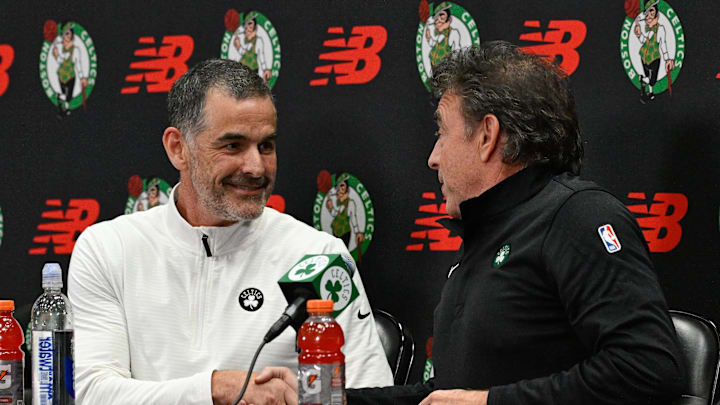Ownership is one of the most underrated drivers of success in professional sports.
That’s why the announcement that the Grousbeck family was selling its stakes in the Boston Celtics—just one month after the franchise’s 2024 championship run—sparked uncertainty among fans.
So far, though, the transition of power has appeared seamless, a tone reinforced during Bill Chisholm’s introductory press conference as the team’s new governor on Thursday, September 25.
Chisholm was joined by Wyc Grousbeck, now serving as CEO, along with president of basketball operations Brad Stevens, co-owner Aditya Mittal, and team president Rich Gotham. Together, they fielded questions on power dynamics in the front office, roster construction, the franchise’s direction, and even the Celtics’ long-term home.
Here are five takeaways that shed light on the Celtics’ future:
1. Accountability and Self-Awareness at the Top
In recent years, several wealthy business owners—Mat Ishbia with the Suns, Joseph Tsai with the Nets, David Tepper with the Panthers—have bought teams and immediately tried to put their stamp on them. Often, the results have been messy.
Chisholm acknowledged that risk directly.
"There is such a thing as a new owner curse, and I’m well aware of that. Ultimately, it’s being self-aware in terms of what your strengths and weaknesses are, and surrounding yourself with the best of the best."
While he made clear he will have final say as governor, Chisholm stressed accountability and a consensus-driven approach, pointing to the trust he has in his basketball operations staff.
"The way the decisions have been made here to date, that’s what you’re going to see going forward as well. Those basketball decisions, Brad [Stevens] is driving that."
For Stevens, that trust matters. He noted that the transition of power has only boosted his confidence to do his job, saying he feels empowered and supported to keep making the kinds of basketball decisions that have defined Boston’s recent success.
2. Spending Strategy
The Celtics spent the 2025 offseason trimming costs to get under the second luxury tax apron. Key pieces from the 2024 championship team were shipped out, and as a result, the talent remaining is slim in comparison.
Stevens emphasized that the changes were less about ownership’s willingness to spend and more about the harsh restrictions in the league’s new collective bargaining agreement.
“The summer demanded a reset under the second apron,” Stevens said, adding that “there’s no tax goal”.
He noted that the trades for Derrick White and Kristaps Porziņģis—both pivotal in Boston’s 2024 championship—would not have been possible under today’s rules because the team took in more salary than it sent out.
Chisholm echoed the need for balance, but his directive was clear.
“Let’s go for it, but let’s do it in a reasonable way,” he said. “My high-level direction to Brad and the team is: let’s do whatever we can to win championships and raise banners, and raise as many as we can in the near-term, but also in the medium- to the long-term as well. The flexibility that Brad talks about is paramount to doing that”.
3. A Relentless Emphasis on Winning
If there was one unifying message from the panel, it was that the Celtics’ focus remains squarely on championships.
Grousbeck, who saw Boston bring home two championships during his tenure as majority owner, and now in his new role as CEO, set the tone.
“I want a third ring. And then I want a fourth one,” Grousbeck said. “I’ve got two, it’s a nice start. This group is committed to getting it together.”
Chisholm reiterated that urgency, repeatedly referencing his desire to raise banners. He made clear that it starts next season, even with an uncertain timeline surrounding Jayson Tatum’s return from injury.
“We need to get better every single day, even without Jayson [Tatum] on the court day one,” Chisholm said.
The message was clear: while health and long-term planning remain critical, Boston’s leadership expects this group to continue pushing toward titles.
4. Outlook for 2025-26
When asked about the upcoming season, Celtics leadership emphasized two themes: health and mindset.
Stevens made it clear that everything begins with Tatum’s recovery.
“My number one goal, number two goal, three goal, four goal is Jayson Tatum fully healthy,” Stevens said. “We know that he’s going to be itching to get back. The most important thing is a fully healthy Jayson Tatum.”
He declined to set a timeline, focusing instead on ensuring Tatum is fully ready whenever he does return.
Chisholm, meanwhile, leaned into the rest of the team’s mindset. He cited the Isaiah Thomas years—seasons when the Celtics exceeded expectations—as some of his favorites. He added that he won’t put ceilings on this year’s group.
“We’re going to embrace the underdog mentality,” Chisholm said.
Regardless of whether Tatum makes his return next season, Boston enters 2025-26 determined to surprise the league.
5. The Celtics’ Future at TD Garden
With the record-setting $6.1 billion sale, some wondered whether it might mark the beginning of the end of the Celtics’ tenure at TD Garden in Boston’s North End. The franchise’s lease runs through the 2035-36 season, but given the price of the sale and the drive to maximize profitability, questions about the Celtics’ long-term home are natural.
Chisholm didn’t close the door on future changes, but made clear how much he values the Garden’s atmosphere.
“The Celtics and the Bruins belong together,” Chisholm said. “We are 100 percent committed to creating the best fan experience possible. We’ll figure out where that is, but we’ve got a great thing going right now.”
For now, it appears TD Garden will remain the team’s home—though Chisholm’s phrasing suggested he is keeping all options open.
